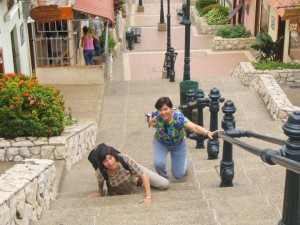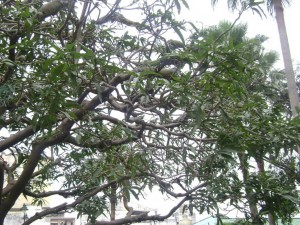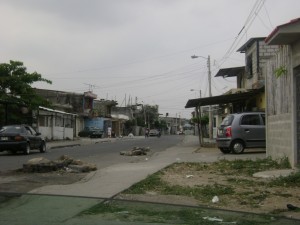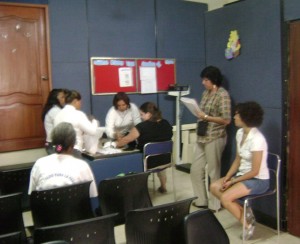Guayaquil
FYI: Given the unreliable internet situation, we have decided to split up blogging responsibilities so that our entries do not overlap. To read about our experience in its entirety, visit ecuador.blogs.rice.edu. Thanks for reading!
Thursday featured a day trip to Guayaquil, the same coast city where our incoming flight from Houston landed to refuel before eventually arriving in Quito. After a half-hour flight from Quito, we spent the morning touring the city with Marisol, who is originally from Guayaquil, as our guide. We took a taxi to the base of a huge hill, and then climbed the 500 steps to the top in order to get an aerial view of the city.


After climbing back down the hill, we spent the rest of the morning walking along the boardwalk area, which is home to monuments, statues, beautiful flowers and trees, street vendors and lots and lots of people. The boardwalk let us to the bahía, a huge tent marketplace where vendors are eager to sell everything from artisan craft and jeans to watches and toys. We then took a taxi (which sounded like it was going to fall apart any minute) to the main plaza, where we were greeted by hundreds of freely roaming iguanas! We could not believe how many there were, and how calm they were!

We then continued to a nice hotel for typical Ecuadorian lunch: pork, a llapingacho (kind of like a mashed potato and cheese pancake), fried plantains and salad. After lunch we finally made our way to the neighborhood 30 minutes outside of the city where Fundación Futuro has a clinic. The community was obviously an extremely poor area, but the clinic itself was very nice. María Alicia and Marisol were there to administer an exam to the health promoters, and Amanda and I were the pretend patients. This was a great way for us to help them out and also see first-hand how their clinic system operates. When patients arrive, health promoters introduce them to the clinic. They emphasize that while the foundation supports them, it truly is the community’s clinic. Patients pay up to 50 cents for the visit, which does not cover the actual costs of their medical care, but does give value to the services that they receive. Health promoters than take their weight, height, blood pressure and temperature, and direct them to see the doctor in general medicine, dentistry, psychiatry or gynecology depending on their needs. It was such a privilege to see the foundation’s work up close and meet the people on the front lines of health care in this developing country. As we learn more about the foundation’s clinics, it becomes easier to envision the role of the technologies we brought from Rice. When we go to Planchaloma next week we hope to begin demonstrating the suite of backpacks along with Sally and the AccuDose. Until then, it’s been a great experience getting to know the people involved with Fundación Futuro and learn about the heroic work they do throughout the country.


